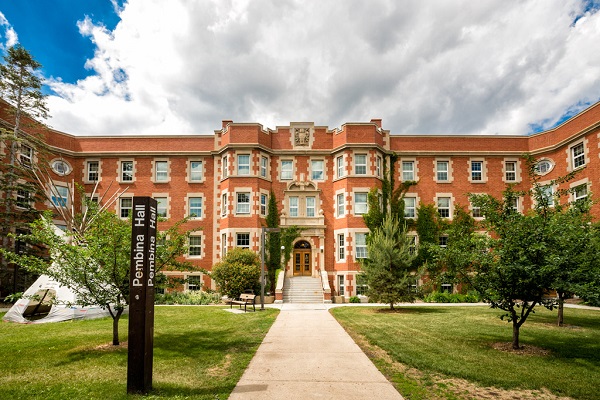University of Alberta: Law students take eye-opening trip through Indigenous legal history
The imaginative exercise projects law students back in time, letting them peer into the Indigenous experience of colonization.
As they walk on a floor covered with blankets at the old powwow grounds of Maskêkosihk (Enoch Cree Nation) — while facilitators recount the Canadian government’s progressive seizure of Indigenous land over hundreds of years — the blankets are randomly removed.
Some students are pulled aside to represent declines in population, following mention of historical events such as smallpox outbreaks or deaths at residential schools.
Tyler Ermineskin, an Indigenous first-year law student of Nehiyaw/Cree descent, described the exercise as “truly impactful,” adding that “it helped me understand why there are so few Indigenous law students today.
“It showed we have a responsibility to create space for ongoing traumas stemming from Canada’s history, and acknowledge them to inform our practice as future lawyers.”
First-year student Rodrigo Vela Figueroa noted the exercise gave him a sense of “the raw human impact that can often be missed when learning about Indigenous history through books, presentations or other similar methods.”
The KAIROS blanket exercise — first developed by the Canadian Ecumenical Justice Initiatives — is a powerful and emotional way to embody the Indigenous experience in Canada, if only briefly. Mental health professionals stand by to assist those who need support.
“It’s easy to sit in a classroom and listen to Indigenous history and disassociate from the material, but this requires engagement,” says Koren Lightning-Earle, legal director of the Wahkohtowin Law and Governance Lodge and sessional instructor in the University of Alberta’s Faculty of Law.
“Not only are they actively participating and actively listening, but their bodies are moving.”
Adapted to put the emphasis on Indigenous legal history by U of A law professor Hadley Friedland — academic director of the faculty’s Wahkohtowin Law and Governance Lodge — the exercise took place last Monday as part of a Foundations of Law course for 180 entering students and members of the judiciary and law society of Alberta.
This is just the second year the Foundations of Law class was held in a First Nations community. Launched five years ago by Lightning-Earle, it’s one way the faculty is responding to Call to Action #28 of the Truth and Reconciliation Commission’s final report, which asks law schools in Canada to require all law students to take a course on Indigenous people and the law.
“This allows the students to see Indigenous people in their own community in a positive way they might never have had the opportunity to,” says Lightning-Earle. “It encourages them to think about those calls to action and what they mean.”
Derek Redman, chief judge of the Provincial Court of Alberta, joined the law students for the blanket exercise. (Photo: Jason Franson)
Derek Redman, chief judge of the Provincial Court of Alberta, joined the law students for the blanket exercise. (Photo: Jason Franson)
One change Friedland made to the KAIROS template was to begin the historical narrative before the advent of colonization, “to make it clear there was a rich, vibrant, Indigenous law before settler contact that continues today,” she says.
“It’s a really efficient way to talk about three or four hundred years of colonization in an hour or two,” she says. “Every year I update it to reflect changes in the law or other things that have happened (such as the revelation of unmarked graves at Kamloops Indian Residential School).
The Foundations of Law course also reflects commitments to reconciliation in the U of A’s new Indigenous Strategic Plan, says Friedland. The plan encourages partnerships between the university and Indigenous communities.
“This course was possible because of a community partnership. We have worked with the Enoch Cree through the Wahkohtowin Law and Governance Lodge, doing Enoch-led Indigenous law revitalization work. It led to Enoch offering to host this.”
The lodge was founded in 2018 as a response to TRC Call to Action #50, which urges the creation of Indigenous law institutes across Canada for the “development, use and understanding of Indigenous laws.”
In addition to the blanket exercise, students had the opportunity to meet with members of the Enoch Cree community — from catering staff to volunteer facilitators to guest speakers and Elder Bruce Lee, who opened the day with a pipe ceremony.
“It’s definitely not a case of non-Indigenous students coming in and being in their own bubble,” says Lightning-Earle.

